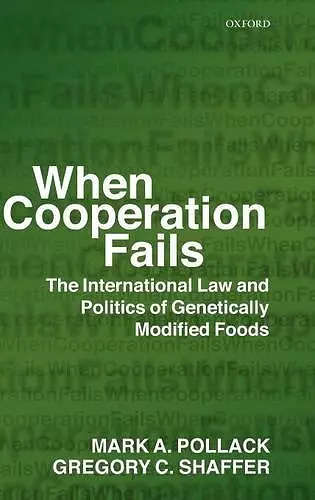When Cooperation Fails
The International Law and Politics of Genetically Modified Foods
Mark A Pollack author Gregory C Shaffer author
Format:Hardback
Publisher:Oxford University Press
Published:21st May '09
Currently unavailable, and unfortunately no date known when it will be back
This hardback is available in another edition too:
- Paperback£37.49(9780199567058)

This book examines the complex transatlantic conflict over genetically modified organisms, highlighting the challenges of international cooperation. When Cooperation Fails offers valuable insights into regulatory dynamics.
The ongoing conflict surrounding genetically modified organisms (GMOs) has created significant tension between the United States and the European Union. In When Cooperation Fails, the authors delve into the complexities of this dispute, highlighting how domestic laws and political climates contribute to the challenges of international cooperation. The book offers a comprehensive analysis of the interplay between transnational networks, international regimes, and global markets, providing a nuanced understanding of the governance surrounding GM foods and crops.
Professors Pollack and Shaffer explore the deeply entrenched regulatory landscapes in both the US and the EU, illustrating how these frameworks have shaped negotiations and decision-making on the global stage. The authors argue that the polarized views on GMOs—where the US largely embraces them while the EU remains skeptical—have led to a protracted legal battle, notably before the World Trade Organization. This ongoing discord reflects not only a clash of regulatory philosophies but also the broader implications for international relations and trade.
Ultimately, When Cooperation Fails emphasizes the multifaceted obstacles that hinder effective international collaboration on GMO regulation. The authors contend that any meaningful resolution must acknowledge these barriers while also exploring the limited options available to both sides when cooperation proves elusive. Their insights shed light on the complexities of global governance and the need for innovative approaches to address persistent disputes in the international arena.
an illuminating and methodologically diverse book...not only a rich interdisciplinary dissection of one of the most intractable trade disputes but also a compelling account of the most spectacular regulatory failure of transatlantic cooperation * Alberto Alemanno, Common Market Law Review *
There is no doubt that this book constitutes a watershed in the literature about the science-politics interface in the international context, and especially in trans-Atlantic cooperation (or lack thereof). The excellent, original, and highly inspiring treatment of this issue, in both theoretical and empirical terms across political and legal disciplines, brings to the fore the deep interdependency in the bilateral, multilateral, and transnational dimensions of the US-EU relations. The five lessons that the authors draw in the concluding chapter open new venues for further research on this matter. But above all, this book is the fruit of a highly successful, tenacious, and systematic research endeavour that provides new insights into this fascinating topic. * Susana Borrás, Science and Public Policy *
The contribution of the work lies in its careful, comprehensive, and ultimately convincing presentation of the arguments...Pollack and Shaffer clearly state that the US and EU regulatory frameworks have been produced in such different ways that they will be resilient to change, even in the face of international pressures, such as WTO rulings. The text contains many facts, a good description, and its scope of research is wide. This book will reward the reader - and cannot be ignored by anyone interested in GMO conflict. * Javier Guillem Carrau ommon Market Law Review *
An engaging and thorough study of a seemingly intractable international trade dispute...Pollack and Shaffer evaluate the potential outcomes of WTO panel approaches beyond that actually adopted in the US-EU dispute using several methodologies. Their comparative institutional analysis offers new and important insights into the consequences of what might superficially seem to be a typical question of exegesis and international treaties. The book ably reveals the potentially weighty political and institutional consequences of choosing one seemingly technical legal interpretation of a treaty over another, and of the choice of treaties identified as those relevant to the dispute. * Aaron Fellmeth, Global Law Books *
The book shows the limits of diplomacy and international law in areas of deeply entrenched differences of perceptions and attitudes in a regulatory field. It offers many of the elements that need to be taken into account in moving the matter forward in international law in coming years. It is an excellent piece of analytical research and highly recommended to all working in agricultural biotechnology regulation and beyond. * Thomas Cottier, World Trade Review *
This book presents an original and an exhaustively researched analysis of one of the difficult and intractable disputes in the transatlantic relationship. It skillfully explores the complex interaction between the national and international dimensions of the GMO dispute in a way that clearly illuminates both the potential and limitations of international regulatory cooperation. Shaffer and Pollack have made a major contribution to our understanding of the legal and political dynamics of regulatory-related trade disputes. * David Vogel, University of California, Berkeley *
Mark Pollack and Greg Shaffer's When Cooperation Fails is a masterful analysis of the causes and consequences of the failure of transatlantic cooperation as it relates to agricultural biotechnology In short, while specialists in agricultural biotech and transatlantic relations will find When Cooperation Fails 'must-reading', the book should also be engaged by a wide range of specialists in international law, politics and political economy. * Joseph Jupille, EUSA Review *
An excellent piece of analytical research and highly recommended to all working in agricultural biotechnology regulation and beyond * Thomas Cottier, World Trade Review *
ISBN: 9780199237289
Dimensions: 243mm x 164mm x 28mm
Weight: 815g
456 pages